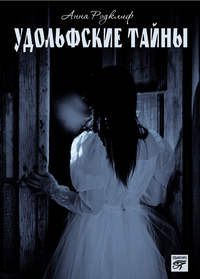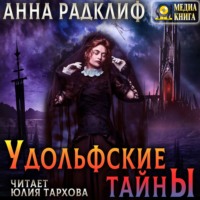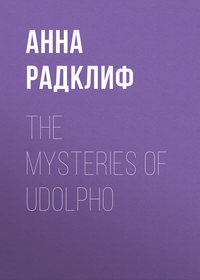
Полная версия
The Mysteries of Udolpho
“The château in the woods!” exclaimed the peasant-“Do you mean that with the turret, yonder?”
“I don't know as for the turret, as you call it,” said Michael, “I mean that white piece of a building, that we see at a distance there, among the trees.”
“Yes, that is the turret; why, who are you, that you are going thither?” said the man with surprise.
St. Aubert, on hearing this odd question, and observing the peculiar tone in which it was delivered, looked out from the carriage. “We are travellers,” said he, “who are in search of a house of accommodation for the night; is there any hereabout?”
“None, Monsieur, unless you have a mind to try your luck yonder,” replied the peasant, pointing to the woods, “but I would not advise you to go there.”
“To whom does the château belong?”
“I scarcely know myself, Monsieur.”
“It is uninhabited, then?” – “No, not uninhabited; the steward and housekeeper are there, I believe.”
On hearing this, St. Aubert determined to proceed to the château, and risk the refusal of being accommodated for the night; he therefore desired the countryman would show Michael the way, and bade him expect reward for his trouble. The man was for a moment silent, and then said, that he was going on other business, but that the road could not be missed, if they went up an avenue to the right, to which he pointed. St. Aubert was going to speak, but the peasant wished him good night, and walked on.
The carriage now moved towards the avenue, which was guarded by a gate, and Michael having dismounted to open it, they entered between rows of ancient oak and chesnut, whose intermingled branches formed a lofty arch above. There was something so gloomy and desolate in the appearance of this avenue, and its lonely silence, that Emily almost shuddered as she passed along; and, recollecting the manner in which the peasant had mentioned the château, she gave a mysterious meaning to his words, such as she had not suspected when he uttered them. These apprehensions, however, she tried to check, considering that they were probably the effect of a melancholy imagination, which her father's situation, and a consideration of her own circumstances, had made sensible to every impression.
They passed slowly on, for they were now almost in darkness, which, together with the unevenness of the ground, and the frequent roots of old trees, that shot up above the soil, made it necessary to proceed with caution. On a sudden Michael stopped the carriage; and, as St. Aubert looked from the window to enquire the cause, he perceived a figure at some distance moving up the avenue. The dusk would not permit him to distinguish what it was, but he bade Michael go on.
“This seems a wild place,” said Michael; “there is no house hereabout, don't your honour think we had better turn back?”
“Go a little farther, and if we see no house then, we will return to the road,” replied St. Aubert.
Michael proceeded with reluctance, and the extreme slowness of his pace made St. Aubert look again from the window to hasten him, when again he saw the same figure. He was somewhat startled: probably the gloominess of the spot made him more liable to alarm than usual; however this might be, he now stopped Michael, and bade him call to the person in the avenue.
“Please your honour, he may be a robber,” said Michael. “It does not please me,” replied St. Aubert, who could not forbear smiling at the simplicity of his phrase, “and we will, therefore, return to the road, for I see no probability of meeting here with what we seek.”
Michael turned about immediately, and was retracing his way with alacrity, when a voice was heard from among the trees on the left. It was not the voice of command, or distress, but a deep hollow tone, which seemed to be scarcely human. The man whipped his mules till they went as fast as possible, regardless of the darkness, the broken ground, and the necks of the whole party, nor once stopped till he reached the gate, which opened from the avenue into the high-road, where he went into a more moderate pace.
“I am very ill,” said St. Aubert, taking his daughter's hand. “You are worse, then, sir!” said Emily, extremely alarmed by his manner, “you are worse, and here is no assistance. Good God! what is to be done!” He leaned his head on her shoulder, while she endeavoured to support him with her arm, and Michael was again ordered to stop. When the rattling of the wheels had ceased, music was heard on their air; it was to Emily the voice of Hope. “Oh! we are near some human habitation!” said she, “help may soon be had.”
She listened anxiously; the sounds were distant, and seemed to come from a remote part of the woods that bordered the road; and, as she looked towards the spot whence they issued, she perceived in the faint moonlight something like a château. It was difficult, however, to reach this; St. Aubert was now too ill to bear the motion of the carriage; Michael could not quit his mules; and Emily, who still supported her father, feared to leave him, and also feared to venture alone to such a distance, she knew not whither, or to whom. Something, however, it was necessary to determine upon immediately; St. Aubert, therefore, told Michael to proceed slowly; but they had not gone far, when he fainted, and the carriage was again stopped. He lay quite senseless. – “My dear, dear father!” cried Emily in great agony, who began to fear that he was dying, “speak, if it is only one word to let me hear the sound of your voice!” But no voice spoke in reply. In the agony of terror she bade Michael bring water from the rivulet, that flowed along the road; and, having received some in the man's hat, with trembling hands she sprinkled it over her father's face, which, as the moon's rays now fell upon it, seemed to bear the impression of death. Every emotion of selfish fear now gave way to a stronger influence, and, committing St. Aubert to the care of Michael, who refused to go far from his mules, she stepped from the carriage in search of the château she had seen at a distance. It was a still moonlight night, and the music, which yet sounded on the air, directed her steps from the high road, up a shadowy lane, that led to the woods. Her mind was for some time so entirely occupied by anxiety and terror for her father, that she felt none for herself, till the deepening gloom of the overhanging foliage, which now wholly excluded the moonlight, and the wildness of the place, recalled her to a sense of her adventurous situation. The music had ceased, and she had no guide but chance. For a moment she paused in terrified perplexity, till a sense of her father's condition again overcoming every consideration for herself, she proceeded. The lane terminated in the woods, but she looked round in vain for a house, or a human being, and as vainly listened for a sound to guide her. She hurried on, however, not knowing whither, avoiding the recesses of the woods, and endeavouring to keep along their margin, till a rude kind of avenue, which opened upon a moonlight spot, arrested her attention. The wildness of this avenue brought to her recollection the one leading to the turreted château, and she was inclined to believe, that this was a part of the same domain, and probably led to the same point. While she hesitated, whether to follow it or not, a sound of many voices in loud merriment burst upon her ear. It seemed not the laugh of cheerfulness, but of riot, and she stood appalled. While she paused, she heard a distant voice, calling from the way she had come, and not doubting but it was that of Michael, her first impulse was to hasten back; but a second thought changed her purpose; she believed that nothing less than the last extremity could have prevailed with Michael to quit his mules, and fearing that her father was now dying, she rushed forward, with a feeble hope of obtaining assistance from the people in the woods. Her heart beat with fearful expectation, as she drew near the spot whence the voices issued, and she often startled when her steps disturbed the fallen leaves. The sounds led her towards the moonlight glade she had before noticed; at a little distance from which she stopped, and saw, between the boles of the trees, a small circular level of green turf, surrounded by the woods, on which appeared a group of figures. On drawing nearer, she distinguished these, by their dress, to be peasants, and perceived several cottages scattered round the edge of the woods, which waved loftily over this spot. While she gazed, and endeavoured to overcome the apprehensions that withheld her steps, several peasant girls came out of a cottage; music instantly struck up, and the dance began. It was the joyous music of the vintage – the same she had before heard upon the air. Her heart, occupied with terror for her father, could not feel the contrast, which this gay scene offered to her own distress; she stepped hastily forward towards a group of elder peasants, who were seated at the door of a cottage, and, having explained her situation, entreated their assistance. Several of them rose with alacrity, and, offering any service in their power, followed Emily, who seemed to move on the wind, as fast as they could towards the road.
When she reached the carriage she found St. Aubert restored to animation. On the recovery of his senses, having heard from Michael whither his daughter was gone, anxiety for her overcame every regard for himself, and he had sent him in search of her. He was, however, still languid, and, perceiving himself unable to travel much farther, he renewed his enquiries for an inn, and concerning the château in the woods. “The château cannot accommodate you, sir,” said a venerable peasant who had followed Emily from the woods, “it is scarcely inhabited; but, if you will do me the honour to visit my cottage, you shall be welcome to the best bed it affords.”
St. Aubert was himself a Frenchman; he therefore was not surprised at French courtesy; but, ill as he was, he felt the value of the offer enhanced by the manner which accompanied it. He had too much delicacy to apologise, or to appear to hesitate about availing himself of the peasant's hospitality, but immediately accepted it with the same frankness with which it was offered.
The carriage again moved slowly on; Michael following the peasants up the lane, which Emily had just quitted, till they came to the moonlight glade. St. Aubert's spirits were so far restored by the courtesy of his host, and the near prospect of repose, that he looked with a sweet complacency upon the moonlight scene, surrounded by the shadowy woods, through which, here and there, an opening admitted the streaming splendour, discovering a cottage, or a sparkling rivulet. He listened, with no painful emotion, to the merry notes of the guitar and tamborine; and, though tears came to his eyes, when he saw the debonnaire dance of the peasants, they were not merely tears of mournful regret. With Emily it was otherwise; immediate terror for her father had now subsided into a gentle melancholy, which every note of joy, by awakening comparison, served to heighten.
The dance ceased on the approach of the carriage, which was a phenomenon in these sequestered woods, and the peasantry flocked round it with eager curiosity. On learning that it brought a sick stranger, several girls ran across the turf, and returned with wine and baskets of grapes, which they presented to the travellers, each with kind contention pressing for a preference. At length, the carriage stopped at a neat cottage, and his venerable conductor, having assisted St. Aubert to alight, led him and Emily to a small inner room, illuminated only by moonbeams, which the open casement admitted. St. Aubert, rejoicing in rest, seated himself in an arm-chair, and his senses were refreshed by the cool and balmy air, that lightly waved the embowering honeysuckles, and wafted their sweet breath into the apartment. His host, who was called La Voisin, quitted the room, but soon returned with fruits, cream, and all the pastoral luxury his cottage afforded; having set down which, with a smile of unfeigned welcome, he retired behind the chair of his guest. St. Aubert insisted on his taking a seat at the table, and, when the fruit had allayed the fever of his palate, and he found himself somewhat revived, he began to converse with his host, who communicated several particulars concerning himself and his family, which were interesting, because they were spoken from the heart, and delineated a picture of the sweet courtesies of family kindness. Emily sat by her father, holding his hand, and, while she listened to the old man, her heart swelled with the affectionate sympathy he described, and her tears fell to the mournful consideration, that death would probably soon deprive her of the dearest blessing she then possessed. The soft moonlight of an autumnal evening, and the distant music, which now sounded a plaintive strain, aided the melancholy of her mind. The old man continued to talk of his family, and St. Aubert remained silent. “I have only one daughter living,” said La Voisin, “but she is happily married, and is everything to me. When I lost my wife,” he added with a sigh, “I came to live with Agnes, and her family; she has several children, who are all dancing on the green yonder, as merry as grasshoppers – and long may they be so! I hope to die among them, monsieur. I am old now, and cannot expect to live long, but there is some comfort in dying surrounded by one's children.”
“My good friend,” said St. Aubert, while his voice trembled, “I hope you will long live surrounded by them.”
“Ah, sir! at my age I must not expect that!” replied the old man, and he paused: “I can scarcely wish it,” he resumed, “for I trust that whenever I die I shall go to heaven, where my poor wife is gone before me. I can sometimes almost fancy I see her of a still moonlight night, walking among these shades she loved so well. Do you believe, monsieur, that we shall be permitted to revisit the earth, after we have quitted the body?”
Emily could no longer stifle the anguish of her heart; her tears fell fast upon her father's hand, which she yet held. He made an effort to speak, and at length said in a low voice, “I hope we shall be permitted to look down on those we have left on the earth, but I can only hope it. Futurity is much veiled from our eyes, and faith and hope are our only guides concerning it. We are not enjoined to believe, that disembodied spirits watch over the friends they have loved, but we may innocently hope it. It is a hope which I will never resign,” continued he, while he wiped the tears from his daughter's eyes, “it will sweeten the bitter moments of death!” Tears fell slowly on his cheeks; La Voisin wept too, and there was a pause of silence. Then, La Voisin, renewing the subject, said, “But you believe, sir, that we shall meet in another world the relations we have loved in this; I must believe this.” “Then do believe it,” replied St. Aubert, “severe, indeed, would be the pangs of separation, if we believed it to be eternal. Look up, my dear Emily, we shall meet again!” He lifted his eyes towards heaven, and a gleam of moonlight, which fell upon his countenance, discovered peace and resignation, stealing on the lines of sorrow.
La Voisin felt that he had pursued the subject too far, and he dropped it, saying, “We are in darkness, I forgot to bring a light.”
“No,” said St. Aubert, “this is a light I love. Sit down, my good friend. Emily, my love, I find myself better than I have been all day; this air refreshes me. I can enjoy this tranquil hour, and that music, which floats so sweetly at a distance. Let me see you smile. Who touches that guitar so tastefully? are there two instruments, or is it an echo I hear?”
“It is an echo, monsieur, I fancy. That guitar is often heard at night, when all is still, but nobody knows who touches it, and it is sometimes accompanied by a voice so sweet, and so sad, one would almost think the woods were haunted.” “They certainly are haunted,” said St. Aubert with a smile, “but I believe it is by mortals.” “I have sometimes heard it at midnight, when I could not sleep,” rejoined La Voisin, not seeming to notice this remark, “almost under my window, and I never heard any music like it. It has often made me think of my poor wife till I cried. I have sometimes got up to the window to look if I could see anybody, but as soon as I opened the casement all was hushed, and nobody to be seen; and I have listened, and listened till I have been so timorous, that even the trembling of the leaves in the breeze has made me start. They say it often comes to warn people of their death, but I have heard it these many years, and outlived the warning.”
Emily, though she smiled at the mention of this ridiculous superstition, could not, in the present tone of her spirits, wholly resist its contagion.
“Well, but, my good friend,” said St. Aubert, “has nobody had courage to follow the sounds? If they had, they would probably have discovered who is the musician.” “Yes, sir, they have followed them some way into the woods, but the music has still retreated, and seemed as distant as ever, and the people have at last been afraid of being led into harm, and would go no further. It is very seldom that I have heard these sounds so early in the evening. They usually come about midnight, when that bright planet, which is rising above the turret yonder, sets below the woods on the left.”
“What turret?” asked St. Aubert with quickness, “I see none.”
“Your pardon, monsieur, you do see one indeed, for the moon shines full upon it;-up the avenue yonder, a long way off; the château it belongs to is hid among the trees.”
“Yes, my dear sir,” said Emily, pointing, “don't you see something glitter above the dark woods? It is a fane, I fancy, which the rays fall upon.”
“O yes, I see what you mean; and who does the château belong to?”
“The Marquis de Villeroi was its owner,” replied La Voisin, emphatically.
“Ah!” said St. Aubert, with a deep sigh, “are we then so near Le-Blanc!” He appeared much agitated.
“It used to be the Marquis's favourite residence,” resumed La Voisin, “but he took a dislike to the place, and has not been there for many years. We have heard lately that he is dead, and that it is fallen into other hands.” St. Aubert, who had sat in deep musing, was roused by the last words. “Dead!” he exclaimed, “Good God! when did he die?”
“He is reported to have died about five weeks since,” replied La Voisin. “Did you know the Marquis, sir?”
“This is very extraordinary!” said St. Aubert without attending to the question. “Why is it so, my dear sir?” said Emily, in a voice of timid curiosity. He made no reply, but sunk again into a reverie; and in a few moments, when he seemed to have recovered himself, asked who had succeeded to the estates. “I have forgot his title, monsieur,” said La Voisin; “but my lord resides at Paris chiefly; I hear no talk of his coming hither.”
“The château is shut up then, still?”
“Why, little better, sir; the old housekeeper, and her husband the steward, have the care of it, but they live generally in a cottage hard by.”
“The château is spacious, I suppose,” said Emily, “and must be desolate for the residence of only two persons.”
“Desolate enough, mademoiselle,” replied La Voisin, “I would not pass one night in the château, for the value of the whole domain.”
“What is that?” said St. Aubert, roused again from thoughtfulness. As his host repeated his last sentence, a groan escaped from St. Aubert, and then, as if anxious to prevent it from being noticed, he hastily asked La Voisin how long he had lived in this neighbourhood. “Almost from my childhood, sir,” replied his host.
“You remember the late marchioness, then?” said St. Aubert in an altered voice.
“Ah, monsieur! – that I do well. There are many besides me who remember her.”
“Yes-” said St. Aubert, “and I am one of those.”
“Alas, sir! you remember, then, a most beautiful and excellent lady. She deserved a better fate.”
Tears stood in St. Aubert's eyes; “Enough,” said he, in a voice almost stifled by the violence of his emotions, – “it is enough, my friend.”
Emily, though extremely surprised by her father's manner, forbore to express her feelings by any question. La Voisin began to apologise, but St. Aubert interrupted him; “Apology is quite unnecessary,” said he, “let us change the topic. You were speaking of the music we just now heard.”
“I was, monsieur – but hark! – it comes again; listen to that voice!” They were all silent;
At last a soft and solemn-breathing soundRose, like a stream of rich distilled perfumes,And stole upon the air, that even SilenceWas took ere she was 'ware, and wished she mightDeny her nature, and be never moreStill, to be so displaced.MILTON.In a few moments the voice died into air, and the instrument, which had been heard before, sounded in low symphony. St. Aubert now observed, that it produced a tone much more full and melodious than that of a guitar, and still more melancholy and soft than the lute. They continued to listen, but the sounds returned no more. “This is strange!” said St. Aubert, at length interrupting the silence. “Very strange!” said Emily. “It is so,” rejoined La Voisin, and they were again silent.
After a long pause, “It is now about eighteen years since I first heard that music,” said La Voisin; “I remember it was on a fine summer's night, much like this, but later, that I was walking in the woods, and alone. I remember, too, that my spirits were very low, for one of my boys was ill, and we feared we should lose him. I had been watching at his bedside all the evening while his mother slept; for she had sat up with him the night before. I had been watching, and went out for a little fresh air, the day had been very sultry. As I walked under the shades and mused, I heard music at a distance, and thought it was Claude playing upon his flute, as he often did of a fine evening, at the cottage door. But, when I came to a place where the trees opened, (I shall never forget it!) and stood looking up at the north-lights, which shot up the heaven to a great height, I heard all of a sudden such sounds! – they came so as I cannot describe. It was like the music of angels, and I looked up again almost expecting to see them in the sky. When I came home, I told what I had heard, but they laughed at me, and said it must be some of the shepherds playing on their pipes, and I could not persuade them to the contrary. A few nights after, however, my wife herself heard the same sounds, and was as much surprised as I was, and Father Denis frightened her sadly by saying, that it was music come to warn her of her child's death, and that music often came to houses where there was a dying person.”
Emily, on hearing this, shrunk with a superstitious dread entirely new to her, and could scarcely conceal her agitation from St. Aubert.
“But the boy lived, monsieur, in spite of Father Denis.”
“Father Denis!” said St. Aubert, who had listened to 'narrative old age' with patient attention, “are we near a convent, then?”
“Yes, sir; the convent of St. Clair stands at no great distance, on the sea shore yonder.”
“Ah!” said St. Aubert, as if struck with some sudden remembrance, “the convent of St. Clair!” Emily observed the clouds of grief, mingled with a faint expression of horror, gathering on his brow; his countenance became fixed, and, touched as it now was by the silver whiteness of the moonlight, he resembled one of those marble statues of a monument, which seem to bend, in hopeless sorrow, over the ashes of the dead, shown
by the blunted lightThat the dim moon through painted casements lends.THE EMIGRANTS.“But, my dear sir,” said Emily, anxious to dissipate his thoughts, “you forget that repose is necessary to you. If our kind host will give me leave, I will prepare your bed, for I know how you like it to be made.” St. Aubert, recollecting himself, and smiling affectionately, desired she would not add to her fatigue by that attention; and La Voisin, whose consideration for his guest had been suspended by the interests which his own narrative had recalled, now started from his seat, and, apologising for not having called Agnes from the green, hurried out of the room.
In a few moments he returned with his daughter, a young woman of pleasing countenance, and Emily learned from her, what she had not before suspected, that, for their accommodation, it was necessary part of La Voisin's family should leave their beds; she lamented this circumstance, but Agnes, by her reply, fully proved that she inherited, at least, a share of her father's courteous hospitality. It was settled, that some of her children and Michael should sleep in the neighbouring cottage.








